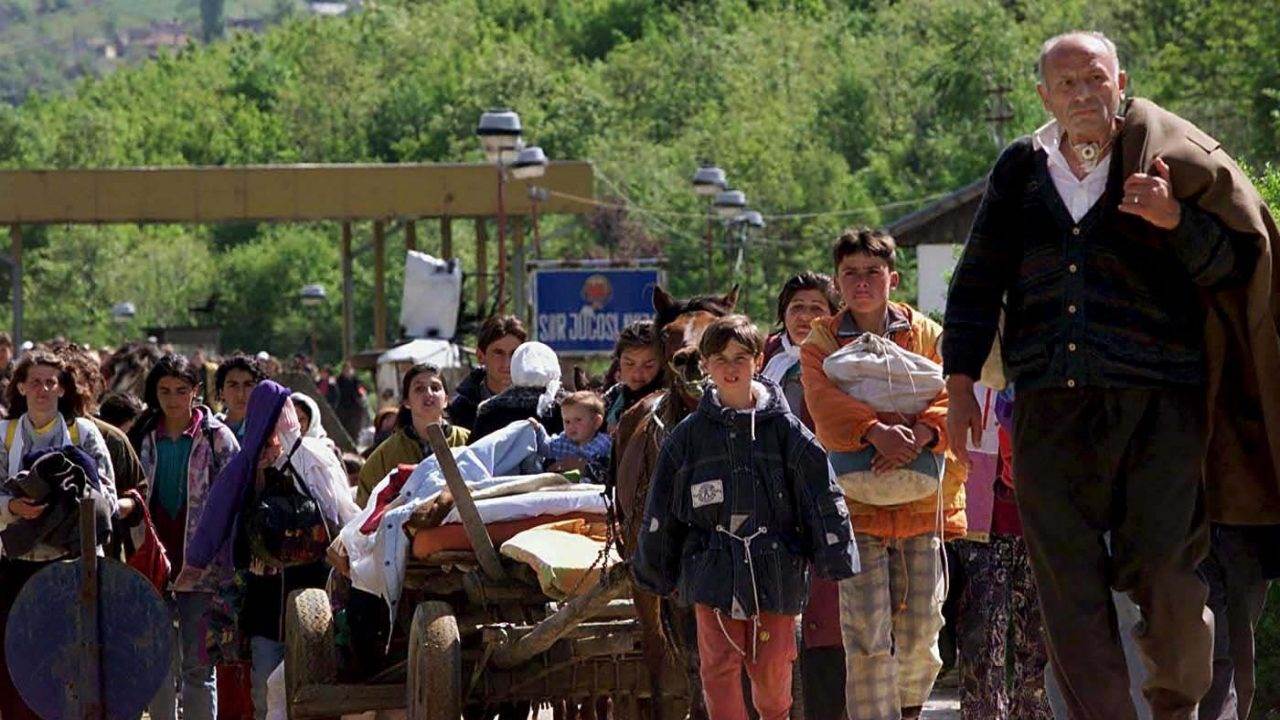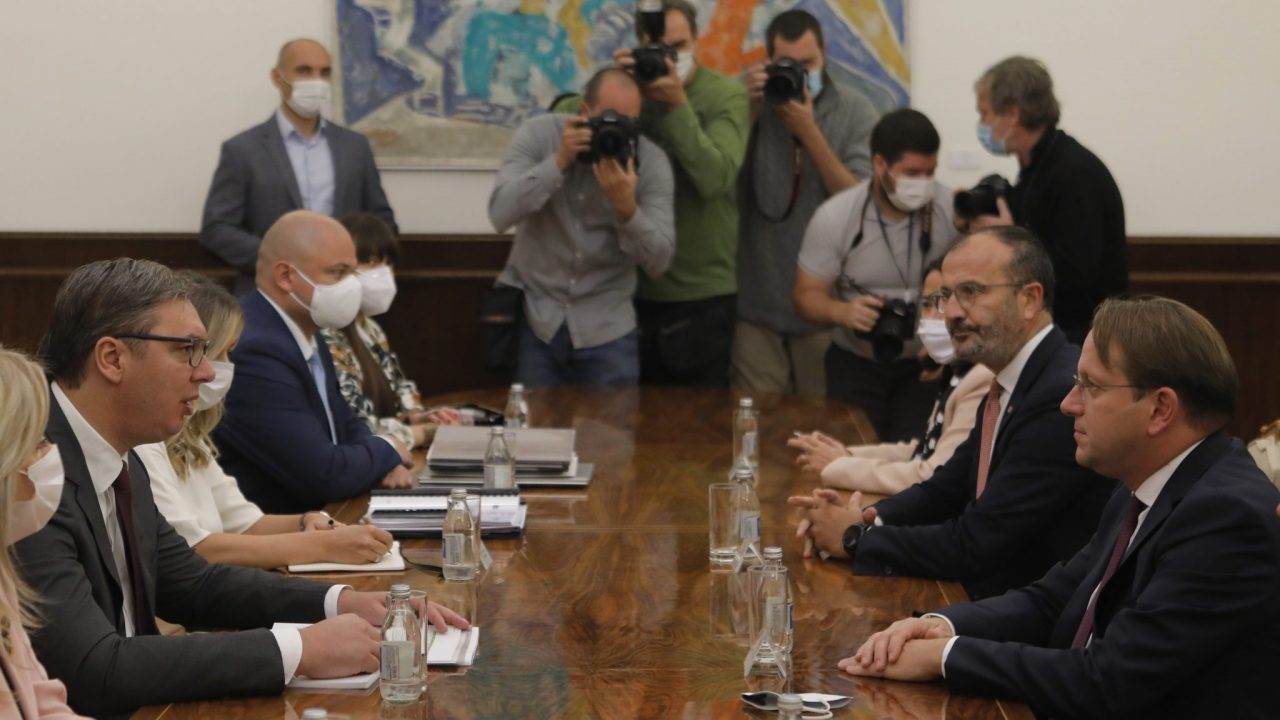This post is also available in: Bosnian
Among them were Hajrije Demaku, with her daughter Esma and son Faton. “In [the village of] Cuska, they took my daughter, they told her to get off the tractor, I thought they were going to ask her something, but they put her in a car and went away. What happened to her, I do not know,” Demaku told Belgrade Higher Court in June 2019.
Esma Demaku is still on list of missing persons from the Kosovo war.
Twelve former members of the 177th Yugoslav Army Unit are on trial for committing war crimes in the western Kosovo villages of Zahac/Zahaq, Cuska/Qushk, Pavlan and Ljubenic that day in May 1999. The indictment alleges that they killed at least 118 ethnic Albanians.
Members of the Demaku family are the most recent witnesses to be heard in the trial. After the hearing at which they testified in June 2019, the next one was supposed to happen in September 2019, but was postponed. In November 2019, there was a hearing at which the Prosecutor’s Office added one more defendant to the case, but in 2020, no hearings were held in the trial at all.
Delays to war crime trials have become commonplace in Serbia, to the dismay of victims and human rights campaigners. Over the past two years, 30 per cent of all hearings in war crime cases were postponed at Belgrade Higher Court – the only court that deals with such trials in Serbia.
As well as the Kosovo village massacre case, these delays have slowed the only trial in Serbia for the 1995 Srebrenica mass killings, as well as the trial of Bosnian Serb fighters accused of kidnapping passengers from a train at Strpci railway station in Bosnia in 1993 and then killing them.
The continuing pattern of postponements raises questions about Serbia’s commitment to prosecuting such cases, said Dr Andi Hoxhaj of the University of Warwick in Britain, an expert on EU enlargement policy in the Western Balkans, EU anti-corruption policy and the rule of law.
“The further postponement of the leading cases and [the lack of prosecutions of] high-ranking suspects suggests that there is a lack of judicial and political will, as well as adequate resources to peruse further with investigations and indictment,” Hoxhaj told BIRN by email.
“In light of the newly discovered remains of bodies suspected to be those of Kosovo Albanians found [in a mass grave] near Raska [in southern Serbia] in 2020, there should be more pressure to speed up the process of investigating high-ranking suspects and indictment – justice delayed is justice denied!” he added.
‘Inappropriately long trials are Serbia’s hallmark’

Hundreds of Kosovo Albanian refugees cross the border into Albania in April 1999. Photo: EPA/ANJA NIEDRINGHAUS.
Various reasons have been given at the Belgrade court for the postponement of trial hearings: defendants’ medical problems or failure to turn up for hearings, technical difficulties in attempts to allow witnesses to testify via video link, or witnesses’ failure to appear in court.
The coronavirus pandemic also reduced the amount of hearings, because from March 15 until May 6, 2020, Serbia was under a state of emergency, and criminal court were only working on urgent cases and prosecutions of people accused of violating pandemic-related restrictions.
But when trials started again, so did postponements; of all the scheduled hearings last year, 32 per cent were postponed. Hearings in the Kosovo village massacre case, the Srebrenica case and the Strpci train abductions case were postponed several times.
In the Strpci case, the prosecution claims that five former Bosnian Serb fighters participated in the abductions and killings of 20 non-Serb civilians who were seized at Strpci station from a train that was on its way from Belgrade to Bar in Montenegro. They were taken to a school in Prelovo, where they were physically assaulted, and then to a burned-out house in the village of Musici, where they were executed.
The Strpci trial started in March 2019, and during its first year, 13 hearings were held and only two postponed. But in 2020, only five hearings were held while four were postponed; the main reason was that witnesses did not turn up.
The Belgrade-based Humanitarian Law Centre, in its annual report about war crime trials for 2017 and 2018, said that “inappropriately long” court proceedings have become “a hallmark of war crimes prosecutions in Serbia over many years”
It argued that overlong, drawn-up trials “has had negative consequences for the rule of law process and the cessation of impunity for serious crimes committed during the 1990s”.
In another case that saw serious delays, Belgrade Higher Court sentenced Rajko Kozlina, a former Yugoslav Army soldier, to 15 years in prison time for leading his unit into the Kosovo village of Trnje/Terrne on March 25, 1999, shooting two civilians, who both survived, and ordering his soldiers to fire on other civilians in the village, causing the deaths of 15 people. His co-defendant was acquitted.
In its report from 2020, the Humanitarian Law Centre noted that “during the main trial, 15 days of trial [hearings] were postponed, as well as several preparatory hearings, mostly due to the alleged health problems of the accused”.
“For these absences, the accused regularly submitted medical certificates from [Serbian] military medical institutions. As a rule, the accused were hospitalised the day before or on the day of the main trial, which was the observation of the presiding judge,” the report said.
The Humanitarian Law Centre had already claimed in 2017 that medical officials at the Military Medical Academy in Belgrade and the Army Hospital in Nis were intentionally obstructing trials of Serbs for alleged war crimes, citing the Trnje/Terrne case as an example.
In March 2019, another hearing in the Trnje/Terrne case was postponed due to Kozlina’s absence, and the judge expressed suspicion that the defendants had been deliberately avoiding the hearings by claiming to have health problems.
The first-instance verdict convicting Kozlina was handed down later in 2019, a year in which three hearings in the Trnje/Terrne trial were held and two postponed. The verdict was upheld the following year, but Kozlina did not turn up to serve his sentence.
EU pressures Serbia over rule of law

EU enlargement commissioner Oliver Varhelyi (right) meets Serbian President Aleksandar Vucic (left) in Belgrade, October 2020. Photo: EPA-EFE/MARKO DJOKOVIC.
As the Humanitarian Law Centre pointed out in its 2019 report, the consequences of many years of delays are “far-reaching and serious”.
“From year to year, the accused die, and the witnesses lose confidence in the Serbian judiciary and do not agree to testify in retrials… In addition to that, the lengthy duration of the proceedings, ie. their repetition, sends a negative and discouraging message to future witnesses and victims that it will be difficult to find justice from Serbian institutions,” the report said.
The delays also have implications for Serbia’s ambitions to join the European Union. Prosecution of war crimes is one of a series of judicial and rule-of-law issues that the country needs to improve upon if it wants to progress towards membership.
The judiciary is part of Chapter 23 in the body of European laws that Serbia needs to harmonise its domestic legislation with during the membership negotiation process, and is considered to be one of three most important of all the 35 chapters.
Serbia issued an action plan for Chapter 23 in in 2015 and adopted a revised one in July last year. But the country still has a lot to do to establish an independent and transparent court system, representatives of NGOs participating in the country’s judicial reform process have said.
The EU’s most recent report on Serbia’s progress, issued in October 2020, said that the country’s handling of war crimes was still a problem, and noted that “several cases have been ongoing for over five years or more”.
Hoxhaj said that the EU is “becoming more demanding to the Western Balkans about their progress in strengthening and upholding the rule of law”.
“Therefore, doing the bare minimum is not good enough anymore and unfortunately for Serbia, it’s not helping itself with continuing not to build a strong and clear track record of high-ranking suspects for war crime – which is a key condition and paramount for its progress in regard to meeting the conditions of Chapter 23, alongside fighting corruption and organised crime,” he explained.
But Marko Kmezic, a lecturer and senior researcher at the Centre for South-East European Studies at the University of Graz in Austria, said that it seems to him that “the European Commission no longer gives that much importance” to war crime issues.
“It threats them as a separate topic, of course, but I do not notice any of the recommendations they have given that Serbia should be considered in terms of prosecuting war crimes before domestic courts,” Kmezic told BIRN.
“A large part of those negotiations then take place somewhere behind closed doors, and we do not know what exactly is expected of Serbia in terms of meeting the standards in terms of the trials for war crimes,” he added.
Postponing trials also has a domestic consequence for Serbia, because if defendants are ultimately acquitted, they have right to be compensated for their expenses and lawyers’ fees. Lawyers also charge for hearings that were scheduled but were not held, if they are not previously cancelled.
In the years to July 2019, Serbia paid out around 941,000 euros to cover the legal expenses of acquitted defendants.
